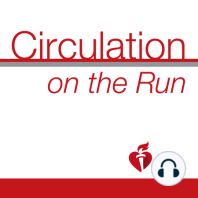17 min listen
Circulation June 11, 2019 Issue
ratings:
Length:
21 minutes
Released:
Jun 10, 2019
Format:
Podcast episode
Description
Dr Carolyn Lam: Welcome to Circulation on the Run, your weekly podcast summery and backstage pass to the journal and it's editors. We're your co-hosts, I'm Doctor Carolyn Lam, Associate Editor from the National Heart Center and Duke National University of Singapore. Dr Gregory Hundley: And I'm Doctor Greg Hundley, Associate editor for Circulation and Director of the Pauley Heart Center at VCU of Health in Richmond, Virginia. Well Carolyn, in the second half of our feature we're going to discuss a randomized clinical trial in lower risked surgical patients related to, the five year clinical echocardiographic outcomes from aortic valve intervention. So Carolyn, do you want to go first this time and discuss on of your favorite papers? Dr Carolyn Lam: Absolutely! So, are Cardiac Troponin T and I equivalent measures of cardiovascular risk in the general population? Well that's the question Doctor Paul Welsh and colleagues from University of Glasgow aimed to look at. They wanted to compare and contrast the associations of Cardiac Troponin T and Cardiac Troponin I with cardiovascular disease and non-cardiovascular disease outcomes, and also determine their genetic determinants in a genome wide association study involving more than nineteen-thousand, five hundred individuals in generation Scotland, Scottish family health study. Dr Gregory Hundley: How about that. So this is kind of interesting. So most of us kind of use these two chests interchangeably Carolyn, and I think, I guess we'd consider them to be almost equivalent. So are you going to tell us that they are the same? Dr Carolyn Lam: Ah-hah! So this is what the authors found. Both Cardiac Troponins T and I were strongly associated with cardiovascular risk, however, Cardiac Troponin I but not T was associated with both myocardial infarction and coronary heart disease. Both Cardiac Troponins I and T had strong associations with cardiovascular death and heart failure, however, Cardiac Troponin T, but not I was associated with non-cardiovascular disease death. They also identified five genetic loci in fifty-three individuals snips that had GWAS significant associations with Cardiac Troponin I and a different set of four loci of four snips for Cardiac Troponin T. So, the upstream genetic causes of low-grade elevations of Cardiac Troponins I and Cardiac Troponin T appear to be distinct and their associations with outcomes also differ. Elevations of Cardiac Troponin I are more strongly associated with some cardiovascular disease outcomes whereas Cardiac Troponin T, is more strongly associated with the risk of non-cardiovascular disease death. These findings can help inform selection of an optimal Troponin essay for future clinical care and research in these settings. Dr Gregory Hundley: Very good! So, does sound like there could be a little bit of a difference, depending upon what outcome you're looking for. So, Carolyn I'm going to discuss a paper from Doctor Alison Wright and colleagues at the University of Manchester, and it involves cardiovascular risk and risk factor management in type two diabetes. So in this retrospective cohort study, using the clinical practice research data link, linked to hospital and death records for people in England, investigators identified 79,985 patients with incident type two diabetes, between the years 2006 and 2013, matched to three 386,547 patients without diabetes, and sex-stratified Cox models were used to assess cardiovascular risk. Dr Carolyn Lam: Oh I'm dying to know, what did they find? Dr Gregory Hundley: Well compared to women without type two diabetes mellitus, women with type two diabetes mellitus had a higher cardiovascular event risk than the adjusted hazard ratios 1.2, with similar corresponding data in men, so their hazard ratio is 1.1. And that lead to
Released:
Jun 10, 2019
Format:
Podcast episode
Titles in the series (100)
Circulation January 24, 2017 Issue: Circulation Weekly: Your Weekly Summary & Backstage Pass To The Journal by Circulation on the Run
